 Introduction & Interview by Bryan Henderson (aka Crow) Preface Profile written by J Attaining a new level of sexual stimulation is often a goal of modifying one's own body. J is a very interesting man who has found his path along this realm of modifying, but what thoughts can he share on the more personal side of modification? What does he face in himself, and from the people he interacts with? J gives us his personal story . . . | |
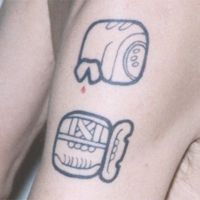 |
I'm not what you'd call an extrovert. Most of my family and
friends have no idea I have a tattoo, piercings and mods. In a
way, that's part of my fun. You may have read my story on BME
under the heading "People/Interviews" and the sub-heading, "J:
The Story of a Subincision." Shannon has had several of my
subincision and piercing pix on BME all the way back to 1995, and
I recently sent an article on "How to Avoid Splitting Headaches,"
on the topic of how to do a nice-looking head split and how to
care for it afterward, and that's listed under BME Extreme,
surgical mods, subincision. I just sent another article on how
to do your own meatotomy. These are in the "members only" part
of BME where the more serious folks gather. I've been interested in body art for a long time. I now have a large subincision, head split halfway back, and three pairs of 8 gauge jewelry up both sides of the subincision. If I'm interested in impressing a partner, I put six captive bead rings in the holes, and they're 3/4" inside diameter and hard to ignore. If I'm going to the gym to work out I just put in six 8 ga. barbells so when I'm in the shower it isn't as obvious that I'm carrying around a significant amount of metal. I've worked out regularly for the past few years, and nobody has ever commented on or questioned my genital piercings, though occasionally somebody will say something about my unusual tattoos. I have tattoos on my left arm, modified from the Modern Primitives drawings of Mayan body art, and one of them represents a penis with the head split and a drop of blood coming out. I can't believe nobody has noticed the piercings: After all, there are three 5/16" balls visible scattered in a row down both sides of the shaft of my cock, and I really don't know what to make of the absence of comment, but that's the way it is. I don't feel like others are avoiding me, and I never saw anyone stare. My body art has often been in celebration of some event in my life, an outward and visible sign of some important inner change. Sometimes a partner got turned on by my plans and that gave the encouragement I needed to go ahead with a project, but usually my body art was something I did for myself, for my own reasons. My first mod was a meatotomy, 25 years ago. One sweet lady was so awed by the meatotomy that when I greased up her finger and slipped it up the urethra she almost came! She liked having the meatotomy opening slid up and down on her clit. Some partners have been afraid the piercings could hurt them or cut them, and once in a while someone will insist that the "hardware" be taken off as what you might call "the price of admission," but eventually, without exception, they come around to letting me gently slide in and start slowly and, well, it makes a believer out of them! I have never surprised a partner by hopping into bed without giving them at least a hint that they're going to find something a little unusual. For one thing, I don't want to listen to their fear, anger, or rejection if they react badly. If they're not the open-minded off-beat person I'm looking for, I'd rather find out sitting next to them on a chair rather than lying beside them on a mattress. Here's an example of the power of mods, especially the subincision (because it's so dramatic). I was burning out in my job five years ago and I knew it wasn't healthy to keep on keeping on but I wasn't sure I had the courage to chuck everything and try to make a childhood dream come true. If I messed up, I could end up either broke or dead or both. I had the feeling I needed a powerful ritual, something physical that could mirror my mental determination to make changes, and if I could somehow link the physical change with the change in outlook and attitude, and if the physical change was something that was permanent, I believed I could make the life change permanent, too! But it had to be an ordeal: I had to earn my new freedom, and that meant paying a price of some kind since nothing worthwhile comes easy. I read about the "coming of age" rituals among the Aborigines of Australia and realized my own society had never really given me a meaningful symbol of manhood except, maybe, for my draft card and my drivers license and the ability to vote or to walk into a bar and order a beer. Not at the same time, of course! The more I read, the more I was hooked. The idea of doing a mod came easy to me, since I had a lot of experience in applied biological sciences and doing mods seemed no stranger to me than sewing a suit would be to a tailor. I did a big subincision in three stages, with plaster models to document the changes. To put the icing on the cake and seal the deal I flew to Toronto, met Shannon, and got pierced by Tom Brazda, a real artist. The best part is, it worked! I quit my job, bought a small sailboat, spent months getting it seaworthy, single-handed down the East coast, found a woman willing to be crew, and we sailed away from the US over hundreds of miles of tropical seas, far out of sight of land. I lived on the boat for two years, and by then I knew two things I wanted to do next: get a head split and come ashore, not necessarily in that order. Mods and piercings are an important part of who I am now, and I really believe if I hadn't made them a part of my life I'd still be living in a part of the country I don't like any more and doing a job I had already done for too long. There are all kinds of reasons to do body art. Some people get mods for the sake of making a public statement. I think some are into pain. Some get addicted to cutting and can't stop: it gets to be an obsession. I can understand all these expressions of individuality and respect them, but my own changes are like the growth rings on a tree. I look at them and they remind me of old hopes, fears, and promises to myself. Promises made good! No regrets. It's been a great trip, and it isn't over yet!
BME: You mentioned that your relatives do not know about your mods. If they were ever to find out, do you think they would be open-minded and accepting of your choices? J: We get to choose our friends but not our relatives. Even so, only a few of my closest friends know about my body art because friends have a spectrum of ability to accept things that are strange to them. I can be selective about whom I tell, partly because not all my friends know each other so I can tell one and ask that they keep it to themselves and be reasonably confident they will not talk about me with people who might not be able to understand. Relatives are a much closer-knit group and while there's the advantage that they are more likely to be accepting, at least in the long run after the initial shock wears off, they are also in much closer communication so it seems impossible to tell one without having everybody know. If I wanted everybody to know, I would want them to know the whole story: how I got started in body art and what it means to me, and I would want the chance to answer their individual questions so that they didn't walk away with fragments of facts or absurd rumors. I see no practical way to do this. I think their initial reactions would be negative and difficult to deal with. In the long run, once they realized I'm the same productive stable guy they've always known and that their new knowledge of me represents a sudden change in their thinking but that I haven't really changed at all, I think they would simmer down and accept, though not completely understand, because not everyone, either friend or relative, is capable of such understanding. In the course of every person's spiritual seeking (at least for those who are seekers), we sometimes find pathways up the mountain that are already well worn, and we may choose to take advantage of some of those paths on the hunch that others who went before us apparently found a way that is safe or a way that gives inspiring vistas. Every person's path is unique. If a guru shows up to tell you the way, you're following his way and not your own and you will never get any further than he got and at that point he will be standing between you and your enlightenment. So I can't tell you about my way, but one thing my own path requires is a drab exterior hiding the 'jewels.' People who make their body art obvious, even impossible to ignore, are on a different path. I find no fault with that, and I could have gone that way but chose not to. BME: What experiences/enlightenments if any caused you to decide you wanted a head split after your two years at sea? J: Several reasons came together at that time. I had gone to sea partly to try to get over a broken relationship and put a "spacer" in my life so I could think about what I wanted to do with the rest of my time here. I was afraid that the trip had failed to quench the pull I still felt toward that person, and it seemed to me that they were the type who would not be able to accept a head split. I hoped that by getting a mod I thought they would not like, it would help me in my decision not to fall back into that relationship. Also, a head split would put me out of commission sexually for about three weeks, and that might help me keep my pants on in their presence. In addition, by the end of the trip I was pretty much alone, bored, without any sex life and genital body mods do provide a sex life -- something erotic that can be done with the body. I know that may sound strange to some people, but I am confident there are others who've been there and know what I mean. If there's nobody around to do something new and different with, you can do it with yourself! I liked the appearance of head splits I saw on BME, and I wanted one. Finally, it was a matter of timing: a head split takes weeks and weeks to heal completely, and if you're ever going to do it you want to pick a time when you're not involved in an ongoing sexual relationship. BME: Many "normal" people in society are not very accepting of modifications in general, and even many pierced and tattooed individuals are not very accepting of more extreme modifications. Many would label someone who has performed the modifications you have as suffering from some form of mental problem or illness. What type of reasoning can you provide to convince them otherwise? Also, why do you think people are so unaccepting of such mods in the first place? J: I went to a Harley rally last spring and listened to the proud owners tell me about their bikes. The frills that made their bikes different from a stock bike fell into three categories. Some were into pin-stripes and patterns, like tribal tattoos, and others favored airbrushed art of scenes that inspired them, more like regular tattoos. Some bought chrome- plated decorations to give their bike an individual touch, and that reminded me of piercings. A few made fundamental changes in the engineering of the bike, affecting performance. Like body mods, if a biker were to make a change that caused a significant reduction in the competitive ability of the bike, I think the others would be turned off and wonder what was the matter with him, and they might have a point! The same with body mods. Extreme mods that interfere with performance are less acceptable or understandable, even to open-minded people, than mods that provide a dramatic change in appearance without causing impaired ability to function. Fun and function are important, I think. There's no doubt that some people attack their bodies for sick reasons. In the medical literature genital mutilation is reported in schizophrenia or serious depression, and alcohol abuse may be a factor. Some guys who cut their genitals want to be female or think they already are, and some are worried about homosexuality and are not able to deal with that, while others may feel guilty over the things their sex drive seems to be urging them toward (such as incest) and they cut to punish themselves and some are only doing what the "voices" told them to do or are punishing themselves for some failure in what they think is the male role. These reasons fall into the "mental" category. It's a little easier to accept a mod when it is widely performed in a particular culture for ceremonial reasons, like circumcision in the Jewish culture. This is the "culture" category. Among some: Aborigines of Australia where subincision is a universal rite of passage, the question of mental health never gets asked since that mod is taken for granted as a part of coming of age! The tribal women are said to appreciate the greater stimulation they get during intercourse because of the increased width of the penis after subincision and may reject an uncut partner. Similarly, some Southeast Asian women want their man to have an ampallang piercing, and in India, some women want a man who has an apadravya. (See BME for details of male genital piercings.) Something as simple as a meatotomy can expose sensitive surfaces to exploration and delight. Some people who would never consider a mod themselves are turned on by their partner's mods. "Bodies Under Siege," by Armando R. Favazza, M.D. has more information on the subject of body modification The author points out that male mods have "diverse explanations and rationalizations ranging from the vulgar and utilitarian to noble and profound sentiments associated with religion and amity." Dr. Favazza comments that the sense of calmness some people feel after self-surgery may be a result of a resolution of unconscious conflicts, but he points out this beneficial effect is usually temporary. The first American psychiatrist to be bold enough to write about self-mutilation was Karl Menninger, in 1938. He divided the causes of so-called self-mutilation into neurotic, psychotic, organic, and religious. (He wrote "Man Against Himself," and in 1959, "A Psychiatrist's World."). Modern psychiatrists frequently consider anyone with a significant male genital body modification to have a character disorder, which is less serious than a psychosis; common diagnoses include antisocial, borderline, and mixed personality disorders. So what do we know? We know that psychotic and severely neurotic patients sometimes mutilate their genitals, and we know that in some parts of the world genital body mods are not only accepted, they are normal. The question you're asking is this: is there a third category? Is there such a thing as a sane person with a genital body mod in our culture? I'd say that just because some people who cut themselves are seriously emotionally disturbed does not mean that everyone who appreciates the artistry or eroticism of genital mods is crazy. Our society is heavily oriented towards machines, and machines work great when they deal with a uniform, predictable product, including us . . . to quote a bright young Harvard graduate (whom I shall identify in just a moment),
" . . . our society tends to regard as a 'sickness' any mode of thought or behavior that is inconvenient for the system, and this is plausible because when an individual doesn't fit into the system it causes pain to the individual as well as problems for the system. Thus the manipulation of an individual to adjust him to the system is seen as a 'cure' for a 'sickness' and therefore as good."In a world that seems bent on packing us all into conformist crypts because a nonconformist is a thorn in the side of educators, consumerist capitalism, and the not-really-two-party political system, a strong natural drive for individuality must find an outlet or risk madness. I believe body art provides one such outlet. Ralph Waldo Emerson, a great American philosopher born nearly 200 years ago, said, "The end of the human race will be that it will eventually die of civilization." Too much of a good thing. Body art is nonconformist and it gives people a relatively safe way of acting out. The Harvard grad, by the way, was Ted Kaczynski. There are some people who are squeamish about any kind of surgery; there are others who are timid and frightened by anything unusual and these folks are not going to accept mods, and because the idea is so foreign to them they are going to have trouble accepting the possibility that a third category could exist: cut your nuts and you're obviously nuts, as far as they're concerned! It's worth mentioning at this point that many doctors are hostile toward people who cut themselves: they hate to see them come into the ER, and some psychiatrists don't want anything to do with them and may place strict limits on the number of such patients they are willing to handle at one time. The word in the profession is that these patients are a major drain of the doctor's emotions and time and treatment results are discouraging. Medical people tend to associate mods with mental illness because the mentally ill people who do mods often botch the job and end up in the emergency room. The people who know what they want and know how to get it done safely avoid the ER and do not come to the attention of doctors. I can think of a few tests that help us to know whether someone is in the first category, and in need of a shrink, or in the third category, and in need of an open-minded partner. The mental patient will probably have negative self esteem. The healthy person will have positive self esteem and will consider that the mod makes him or her more attractive or interesting. The mental patient will probably act impulsively without adequate research of the dangers and techniques but the healthy person will spend a lot of time deciding if they really want to take this step, and if they want it they will spend more time learning how it can be done safely. As for me, I've had one productive career and I'm starting another and I'm neither sadistic nor masochistic. I've attained the appearance I wanted and I've stopped cutting. The healthy person knows what they want and when it's been achieved they quit. The neurotic (or worse) just keeps on cutting. BME: Do you think modifications such as yours will ever reach the popularity and acceptance that mods like piercings and tattoos have today? J: I doubt it, for many reasons. Major male mods like subincision and head splitting are by their nature the sort of thing you don't go around showing in public, so the average person doesn't know they exist. Even female sex workers , who must see hundreds or thousands of men every year, are surprised by my mods. Some consider them bizarre, possibly because they're hard for the average person to understand so they get branded as something crazy. It's true that severe mutilation like self-penectomy and self-castration is sometimes done as an act of desperation by someone who has serious mental problems, and I think the public at large isn't interested in making a distinction between body mods and self mutilation so the whole process often gets labeled as insane. Anyone who wants a tattoo can find a skilled artist who uses sterile supplies and the process is reasonably safe, available, and affordable. Same with piercing. These things have become popular. Mods, in contrast, are another matter. They can be expensive and painful and they may require a long healing time. Some talented cutters hesitate to work in this lawyer-happy society. It's hard to find an experienced cutter who knows the anatomy well, knows what's possible and what's foolish, and can give sensible advice for the healing period. BME: Do you have any future plans for further modifications? If so, what? J: I'm happy with the way my head split's curves blend with the subincision, and I've got enough piercings. I've asked an artist to design a tattoo that will commemorate my present life, another "growth ring" in my tree, but it isn't a genital tattoo and it isn't erotic. As I said earlier, one difference between body art and self-mutilation is the ability to know when enough is enough. BME: Is there any type of body modification that you haven't performed that you find especially interesting? J: I am amazed by some of the wilder mods like deep shaft piercings or genital bisection or subincision all the way to the scrotum. I think scrotal reduction looks neat. These things are not for me, though. BME: Is there any type of body modification that you have a problem with? That you can't see the reasoning behind or that bothers you? J: I believe fun and function are important and I wouldn't sacrifice either one for the sake of attaining a "far out" appearance. Fun? I want to be able to have intercourse, but penetration with a bisected penis has to be difficult or borderline impossible. Function? I don't want to have to pee sitting down. I did that for a while (see "J: The Story of a Subincision") but not any more, and it's very handy to be able to whip it out and use a urinal. Obviously, I'm not into penectomy or castration. That doesn't mean I'm making negative judgements about guys who want or have had those mods. They violate my principles of fun and function and I think there's little doubt that the people who want them have emotional problems. Now that might sound like disapproval except for this: some people may find such a radical surgical approach the best solution to their problems and after they recover from the modification they may find new relief from their emotional pain. Who could disapprove of that? After all, it's their body and their path, and I'm on the outside looking in but they're on the inside looking out and it's their life and their choice. I want to believe that nothing human is alien to me.
|
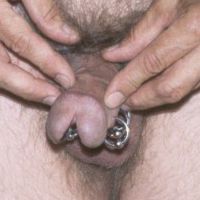 | |
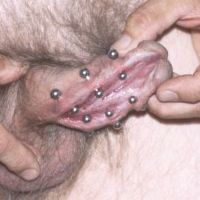 | |
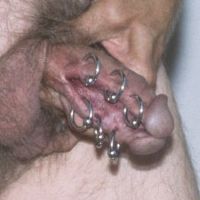 | |
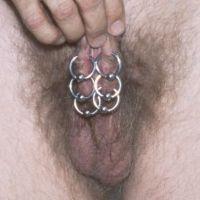 | |
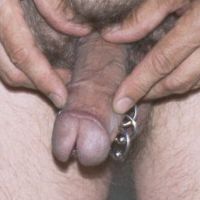 | |
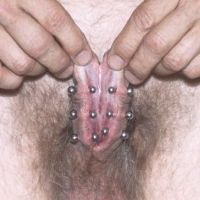 | |
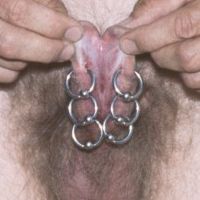 | |
|
return to BME/people | |